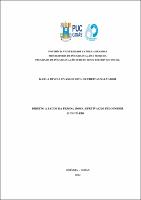| Compartilhamento |


|
Use este identificador para citar ou linkar para este item:
http://tede2.pucgoias.edu.br:8080/handle/tede/4982| Tipo do documento: | Dissertação |
| Título: | Direito à saúde da pessoa idosa: efetivação pelo poder judiciário |
| Título(s) alternativo(s): | Right to health for the elderly: enforcement by the judiciary |
| Autor: | Salvador, Karla Divina Evangelista de Freitas  |
| Primeiro orientador: | Paula, Gil César Costa de |
| Primeiro membro da banca: | Gonçalves , Carla Agda |
| Segundo membro da banca: | Santos, Nivaldo dos |
| Resumo: | O presente trabalho trata do direito à saúde da pessoa idosa, entendendo-se este como um direito fundamental e social, expressamente previsto como direito de todos e dever de Estado. Partindo-se da premissa da inefetividade da Constituição Federal, pela omissão do Estado, que inviabiliza o direito à saúde dos idosos, pretende compreender e analisar o papel do Poder Judiciário na dinâmica de efetivação da proteção deste direito, garantido pela Constituição Federal de 1988 e pelo Estatuto do Idoso. O Poder Judiciário representa o garantidor daquele direito que está previsto constitucionalmente e reiterado no Estatuto do Idoso, que deve ser interpretado para realizar a cidadania, garantindo ao idoso o direito à vida, sua dignidade e sua participação na sociedade. De início, o estudo se desenvolveu no sentido de compreender as diversas etapas do processo de envelhecimento, que compõem a condição de vulnerabilidade do idoso. Destacou a autonomia da pessoa idosa, a qual significa ter capacidade de deliberar a respeito de seus próprios objetivos, bem como acerca da natureza prioritária do direito à saúde na terceira idade. Apontou-se para o princípio da dignidade da pessoa humana como de valor máximo na ordem jurídica e de conteúdo abrangente, que norteia outros princípios do ordenamento jurídico, como o de melhor interesse do idoso e o da solidariedade. Observou-se que os idosos encontram dificuldades no que diz respeito à efetivação de políticas públicas e, por isso, recorrem ao judiciário, visando compelir o Estado a cumprir o dever que a Constituição lhe impõe, garantindo, assim, o exercício do direito à saúde. Por fim, a pesquisa destacou a atuação que detém o Poder Judiciário, examinando decisões proferidas pelos Tribunais Superiores, bem como as produzidas perante o Tribunal de Justiça de Goiás, quando se trata de políticas públicas de saúde, especialmente das demandas pertinentes à saúde do idoso e, ainda, estudou as teorias da "reserva do possível" e do "mínimo existencial" |
| Abstract: | The present work deals with the right to health of the elderly, understanding this as a fundamental and social right, expressly foreseen as a right of all and a duty of the State. Starting from the premise of the ineffectiveness of the Federal Constitution, due to the State's omission, which makes the right to health of the elderly unfeasible, it intends to understand and analyze the role of the Judiciary in the dynamics of effective protection of this right, guaranteed by the Federal Constitution of 1988 and by the Elderly Statute. The Judiciary represents the guarantor of that right that is constitutionally foreseen and reiterated in the Elderly Statute, which must be interpreted to achieve citizenship, guaranteeing the elderly the right to life, their dignity and their participation in society. Initially, the study was developed in order to understand the different stages of the aging process, which make up the condition of vulnerability of the elderly. He highlighted the autonomy of the elderly, which means having the ability to deliberate about their own goals, as well as about the priority nature of the right to health in the elderly. It was pointed to the principle of human dignity as the highest value in the legal system and comprehensive content, which guides other principles of the legal system, such as the best interest of the elderly and solidarity. It was observed that the elderly find it difficult to implement public policies and, therefore, resort to the judiciary, aiming to compel the State to fulfill the duty that the Constitution imposes on it, thus guaranteeing the exercise of the right to health. . Finally, the research highlighted the role of the Judiciary, examining decisions handed down by the Superior Courts, as well as those produced before the Court of Justice of Goiás, when it comes to public health policies, especially the demands related to the health of the elderly. and, still, studied the theories of the "reserve of the possible" and of the "existential minimum" |
| Palavras-chave: | Idoso. Direito à saúde Políticas públicas Poder judiciário Elderly Right to health Public policy Judicial power |
| Área(s) do CNPq: | Ciências Sociais Aplicadas Serviço Social |
| Idioma: | por |
| País: | Brasil |
| Instituição: | Pontifícia Universidade Católica de Goiás |
| Sigla da instituição: | PUC Goiás |
| Departamento: | Escola de Ciências Sociais e da Saúde |
| Programa: | Programa de Pós-Graduação STRICTO SENSU em Serviço Social |
| Citação: | SALVADOR, Karla Divina Evangelista de Freitas. Direito à saúde da pessoa idosa: efetivação pelo poder judiciário. 2022. 108 f. Dissertação (Mestrado em Serviço Social) -- Escola de Ciências Sociais e da Saúde, Pontifícia Universidade Católica de Goiás, Goiânia, 2022. |
| Tipo de acesso: | Acesso Aberto |
| URI: | http://tede2.pucgoias.edu.br:8080/handle/tede/4982 |
| Data de defesa: | 30-Jun-2022 |
| Aparece nas coleções: | Mestrado em Serviço Social |
Arquivos associados a este item:
| Arquivo | Descrição | Tamanho | Formato | |
|---|---|---|---|---|
| Karla Divina Evangelista de Freitas Salvador.pdf | Texto Completo | 2,18 MB | Adobe PDF |  Baixar/Abrir Pré-Visualizar |
Os itens no repositório estão protegidos por copyright, com todos os direitos reservados, salvo quando é indicado o contrário.




